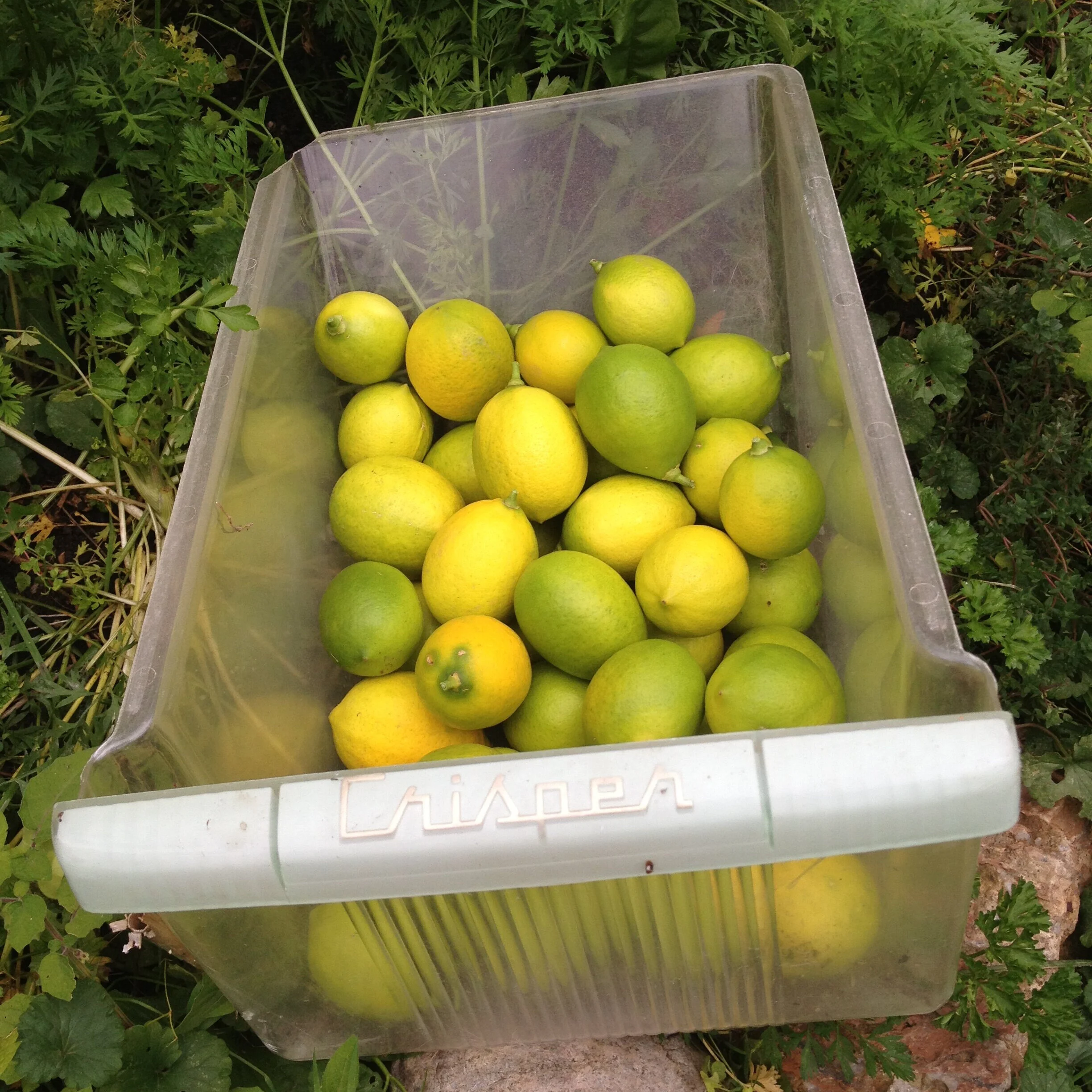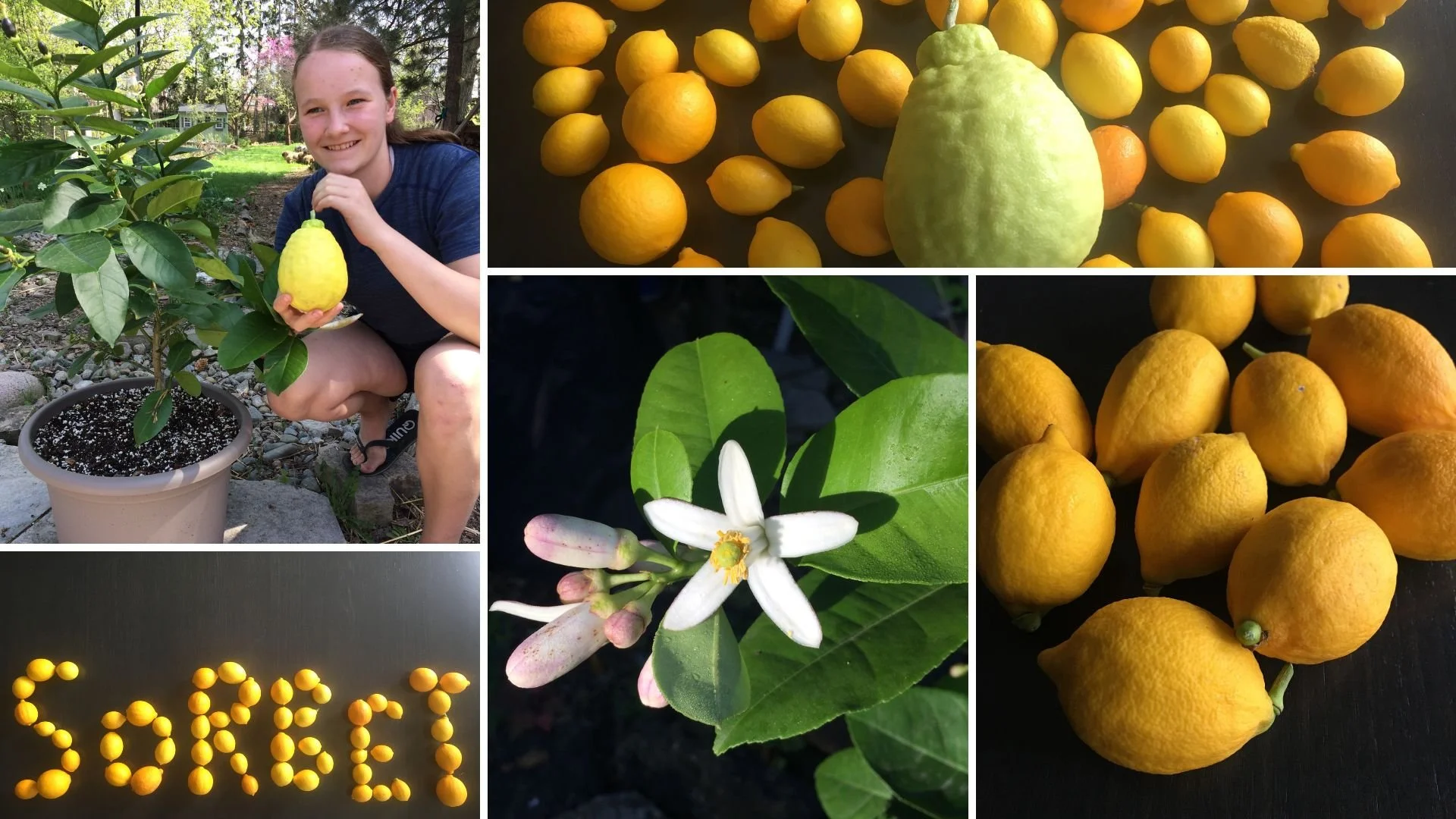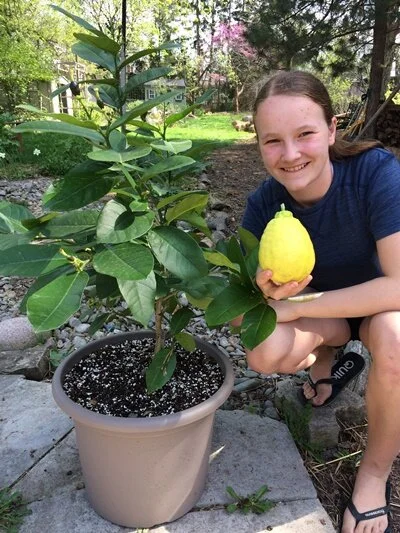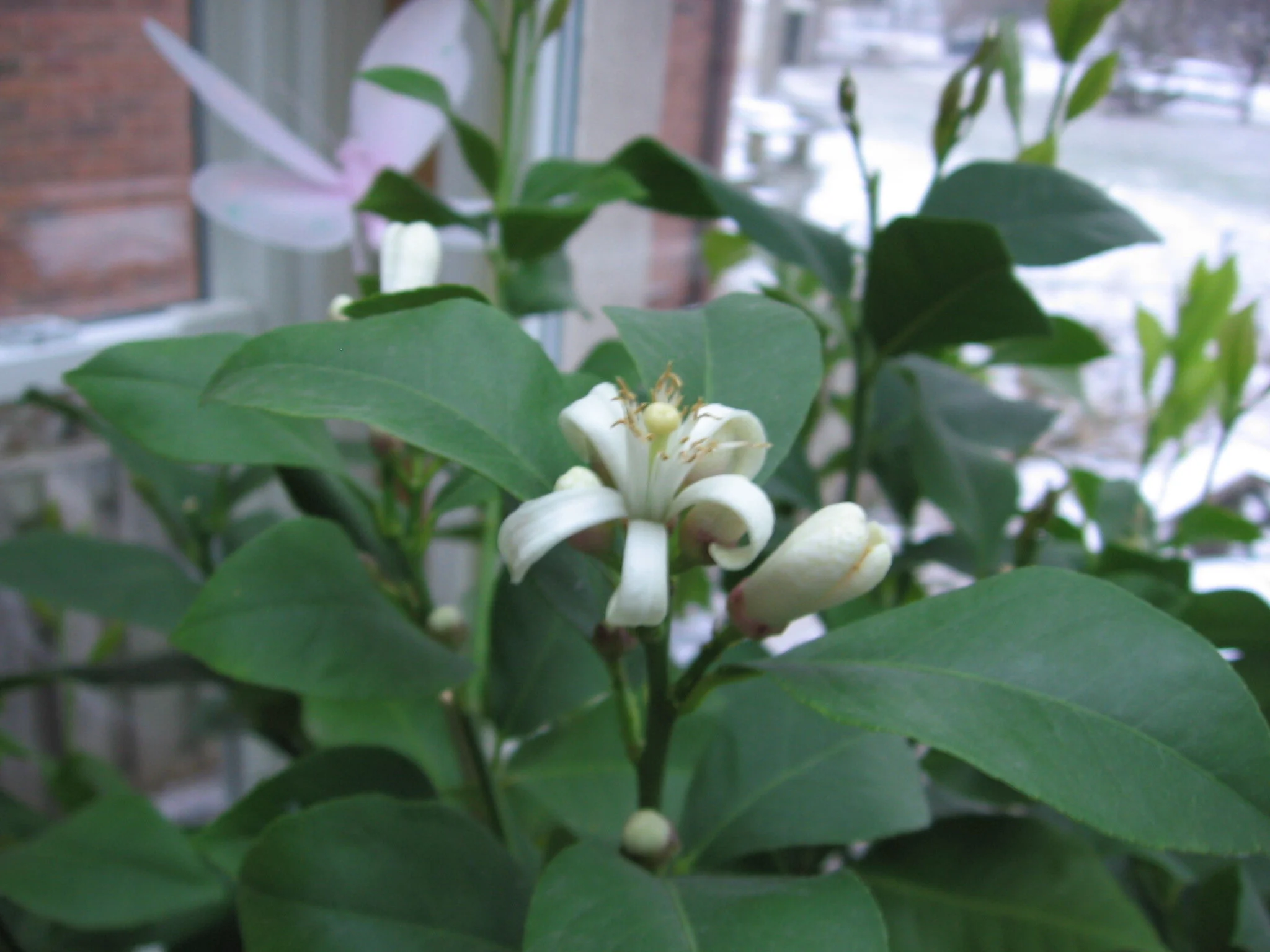By Steven Biggs
You CAN Grow Lemons Somewhere Cold!
Yes you can. Grow citrus trees. Even in places where they don’t normally survive the winter.
There are many ways to successfully keep lemon trees alive over the winter.
You don’t need a greenhouse—and you don’t need a bright, sunny window.
Here are my Top 6 reasons to grow a lemon tree in a cold-climate garden.
1. Lemon Trees are Forgiving
As a student I worked at a small U.K. nursery that had the U.K. National Collection of citrus trees. I brought home a couple of small Meyer lemon trees in my suitcase at the end of that summer.
6 Reasons to Grow a Lemon Tree in a cold climate. A Toronto lemon harvest!
Then those lemon trees languished for years. I was a student and moved around a lot, so they went from fluorescent lights to dimly lit apartment windows. It wasn’t until I moved into my first house that I started to pay attention to my lemons.
When one of my now knee-high Meyer lemon trees bore over 50 lemons in one picking — the small tree was so laden with fruit it looked like it was doing yoga stretches — I was hooked!
But until then, that lemon bush withstood a decade of me not knowing what I was doing.
Find out How to a Grow Lemon Tree Indoors (That Actually Produces Lemons)
2. Lemon Trees are Cold-Hardy
When we moved from our bungalow to a house with an old sunroom that stayed just above freezing over the winter, my lemons were happier than they had ever been. The cool winter temperatures suited them. There were fewer insect pests, and when spring came, those trees flowered as they had never flowered before.
“One of my now knee-high Meyer lemon trees bore over 50 lemons in one picking!”
3. Lemon Fruits Ripen in Moderate Climates
While Bob grows lemon trees outdoors, he grows oranges and other “sweet” citrus in a greenhouse. Lemons don’t need this extra heat to ripen.
Lemons ripen in climates too cool to properly ripen other citrus.
Canadian citrus expert Bob Duncan lumps citrus into two broad groups: “sweet” citrus such as oranges and grapefruit, and “acid” citrus such as lemons and limes.
This distinction is very useful for cold-climate gardeners to understand because sweet citrus need a sustained high summer heat for sugars to develop in the fruit. Acid citrus, on the other hand, doesn’t need sustained heat to ripen.
Bob lives in the Pacific North-West region of North America, which has a moderate climate. To get his sweet citrus to ripen, he uses an unheated greenhouse. The greenhouse is for additional summer heat — not because of winter hardiness!
BUT THE LEMONS — an acid citrus — don’t need the greenhouse to ripen, even though the summer temperatures are not hot where he is. “With lemons, they don’t need as many summer heat units,” Bob explains. (“Heat units” is a concept often used in agriculture. It considers daily maximum and minimum temperatures and the heat that a plant experiences during a growing season.)
When you consider its combination of cold-hardiness and ripening requirements, lemon makes a very practical citrus for the home gardener in a cold climate.
Find Out How to Grow Your Own Lemons
Harvest more lemons this year. Grow Lemons in Cold Climates Masterclass shows you how to grow a lemon tree in a pot or outside with protection. And get lemons!
4. There’s a Thrill in Pushing Boundaries
You may be surprised to learn that there is a history of lemons being grown way beyond the boundaries of where they could survive without human help.
The lemon has a bit of a cold-climate pedigree!
My daughter with a Ponderosa lemon tree and a lemon harvested in the spring. Note the smaller lemons that will ripen later in the year.
Time and again gardeners and farmers in areas that would normally be too cold for lemon cultivation have devised ways to grow lemons.
If you are interested in a delicious mix of history, horticulture, cooking ideas, and travel, check out The Land Where Lemons Grow: The Story of Italy and Its Citrus Fruit. Author Helena Attlee explores the history of citrus fruits in Italy, including some cool-climate adaptations. Of course, I didn’t read the book in the order it’s written. I went straight to the chapters about Amalfi and Lake Garda, which have a history of growing lemons in sub-optimal climates.
If growing a lemon tree in a cool climate sounds like a lot of bother, well, honestly … it is. But maybe you’re like me and enjoy the challenge of growing something that’s not supposed to succeed in your climate. You wouldn’t be the first.
5. Lemons are Versatile in the Kitchen
Some people are surprised to hear that I think it’s worth the effort of growing lemons even though they are widely available in supermarkets.
But trust me, it’s worth the effort.
Lemons are best when they are fresh. It’s no fun trying to zest or juice a shrivelled, dry lemon that has sat out too long. The easiest way to store lemons so that they stay fresh is on the tree—they last a long time on the tree!
In February I can pick a handful of Meyer lemons from the trees stowed in my greenhouse and make sorbet. The juice and rind of this lemon have a unique flavour (often described as a cross between a mandarin orange and a conventional lemon) that really can’t be beat.
There’s Also the Zest
I’ll also zest a Ponderosa lemon into our chicken kebab marinade. Again, a unique taste I can’t buy at the grocery store. The Ponderosa lemon zest is a bit lime-like to my taste buds. (It’s no surprise that it has a unique flavour because it is thought to have some citron, another citrus, in its ancestry.)
Don’t Forget the Leaves
When you grow your own lemon trees, you can harvest more than just the fruit: Mid-winter I will grab a few lemon leaves to wrap around kebabs that I’m cooking on the grill. Lemon leaves are fragrant when bruised or torn, and impart nice flavour into a kebab while keeping it moist.
Grow a lemon tree for the fragrant flowers that come out at the same time that fruit is ripening on the plant.
6. You Get Flowers and Fruit at the Same Time
Some citrus plants flower once a year. Bob Duncan’s oranges, for example, bloom once, in the spring.
Not Lemons! Lemons yield fruit at different stages of maturation and flowers all at same time.
Even after the main spring bloom is over, you can still enjoy the fragrance of the flowers. With lemons, home gardeners can enjoy harvesting fruit and the fragrance of blossoms year-round.
Good for the patio: good for the kitchen garden!
Find Out How to Grow Your Own Lemons
Harvest more lemons this year. Grow Lemons in Cold Climates Masterclass shows you how to grow a lemon tree in a pot or outside with protection. And get lemons!
Lemon + Citrus FAQ
Do lemons grow on trees or bushes?
Both. How the plant grow depends on two things:
How you prune it.
Natural growth habit of the plant. (Meyer lemons have more of a bush-like growth habit.)
Are there indoor citrus trees?
The conditions in centrally-heated homes tend to be warmer and drier than is ideal for most citrus. You can still grow potted citrus in a bright window — but a cool bright sunroom or greenhouse is better.
For more about how to grow indoors, read this article about how to grow a lemon tree indoors.
How to you feed citrus trees?
Read this article about how to grow a lemon tree indoors.
Can you grow oranges in Canada?
You can grow oranges in a greenhouse, or as a potted plant that gets winter protection.







